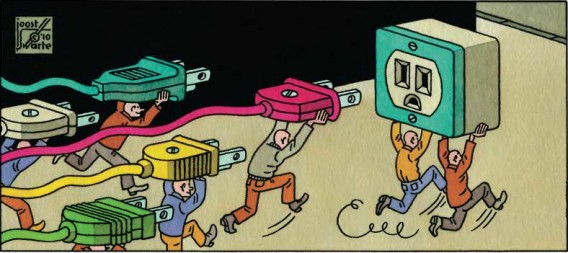















December 13, 2010 | permalink

In the new issue of The New Yorker, David Owen dredges up “the Jevons Paradox,” named for the Victorian era British economist William Stanley Jevons, who worried about “peak coal” a century before Americans began fretting about peak oil. Owen’s story is still behind the paywall at the moment, so if you’d like to learn more about the Jevons Paradox (and you should), here’s a brief excerpt from Aerotropolis:
Six years later, the British economist William Stanley Jevons declared another long emergency. The Coal Question, published in 1865, was An Inconvenient Truth for Victorian England– a clear- eyed description of Britain’s looming peak coal reckoning, complete with a sobering analysis of the country’s coal reserves cross- referenced with its ravenous consumption. The country would run out of coal in less than a hundred years, he estimated, and the result would be cataclysmic. “It is the material energy of the country– the universal aid– the factor in everything we do,” he wrote with spooky prescience. “With coal almost any feat is possible or easy; without it we are thrown back into the laborious poverty of early times.” Once Britain had run out, its ability to sustain 10 percent population growth each decade (as it had done for the previous seven) would collapse under its inability to grow or transport enough food. Worse, there appeared to be no alternatives– no fuels to replace it, in Jevons’s estimation– and any increases in the steam engine’s efficiency would only make it cheaper and easier to use, thus stoking greater demand and faster depletion.
These were not the ravings of a fringe theorist. Jevons was as sober and as mainstream an economist as any Nobel- winning member of the Chicago School today. His suggestion made its way on to the floor of the House of Commons, where no less than future prime minister William Gladstone– then chancellor of the exchequer– referred to the looming peak coal crisis in his bud get speech of 1866. A “coal panic” ensued, leading to the appointment of a blue- ribbon royal commission. Five years later, it published the first detailed estimate of Britain’s coal reserves but managed to sidestep Jevons’s conclusions altogether. The public went back to sleep. Britain’s coal did not run out, and the isles didn’t become fully reliant on oil until after World War I.
The “Jevons Paradox” still troubles us: The more efficiently you use a resource, the more of it you will use. Put another way: The better the machine, the broader its adoption. And there has never been a better machine for transportation than the jet engine. A pair of General Electric GE90- 115B turbofans mounted on a 777 are capable of generating 230,000 pounds of thrust between them– enough to propel four hundred passengers between New York and London in six and a half hours, with gas mileage equivalent to fifty five miles per gallon per passenger. But the aggregate cost is still staggering: twenty five thousand gallons of fuel ignited in the upper atmosphere. Fifty years of refinements have yielded engines cleaner by an order of magnitude, but any gains in efficiency have been far outpaced by exponential growth in the number of passengers– the inevitable result of falling costs and ticket prices.
The Jevons Paradox illustrates why infinitely renewable, zero- carbon fuels are a necessity– because merely efficient solutions only postpone the day of reckoning. Peak whale teaches us how an entire way of life underpinned by a single source of energy can be transformed or vanish overnight thanks to timely substitution. If you had told Herman Melville in 1851 that whaling would be a historical footnote within a decade–replaced by viscous tar oozing out of the ground– he would have been dumbfounded. “One day the planks stream with freshets of blood and oil,” he wrote in Moby-Dick, and the next day, they were gone. How could he have imagined the sweet crude yielding light, flight, locomotion, and the Green Revolution?
Peak whale ended when whalers “ran out of customers before they ran out of whales,” quipped the environmentalist Amory Lovins, who was charting paths to a renewable future before Jimmy Carter wore cardigans in the White House. So how will peak oil end?

» Folllow me on Twitter.
» Email me.
» See upcoming events.

Greg Lindsay is a generalist, urbanist, futurist, and speaker. He is a non-resident senior fellow of the Arizona State University Threatcasting Lab, a non-resident senior fellow of MIT’s Future Urban Collectives Lab, and a non-resident senior fellow of the Atlantic Council’s Scowcroft Strategy Initiative. He was the founding chief communications officer of Climate Alpha and remains a senior advisor. Previously, he was an urban tech fellow at Cornell Tech’s Jacobs Institute, where he explored the implications of AI and augmented reality at urban scale.

January 31, 2024
Unfrozen: Domo Arigatou, “Mike 2.0”
January 22, 2024
The Future of Generative AI in Architecture, Engineering, and Construction
January 18, 2024
The Promise and Perils of the Augmented City
January 13, 2024
Henley & Partners: Generative AI, Human Labor, and Mobility

----- | January 22, 2024
The Future of Generative AI in Architecture, Engineering, and Construction
----- | January 1, 2024
----- | August 3, 2023
CityLab | June 12, 2023
Augmented Reality Is Coming for Cities
CityLab | April 25, 2023
The Line Is Blurring Between Remote Workers and Tourists
CityLab | December 7, 2021
The Dark Side of 15-Minute Grocery Delivery
Fast Company | June 2021
Why the Great Lakes need to be the center of our climate strategy
Fast Company | March 2020
How to design a smart city that’s built on empowerment–not corporate surveillance
URBAN-X | December 2019
CityLab | December 10, 2018
The State of Play: Connected Mobility in San Francisco, Boston, and Detroit
Harvard Business Review | September 24, 2018
Why Companies Are Creating Their Own Coworking Spaces
CityLab | July 2018
The State of Play: Connected Mobility + U.S. Cities
Medium | May 1, 2017
Fast Company | January 19, 2017
The Collaboration Software That’s Rejuvenating The Young Global Leaders Of Davos
The Guardian | January 13, 2017
What If Uber Kills Public Transport Instead of Cars
Backchannel | January 4, 2017
The Office of the Future Is… an Office
New Cities Foundation | October 2016
Now Arriving: A Connected Mobility Roadmap for Public Transport
Inc. | October 2016
Why Every Business Should Start in a Co-Working Space
Popular Mechanics | May 11, 2016
Can the World’s Worst Traffic Problem Be Solved?
The New Republic | January/February 2016